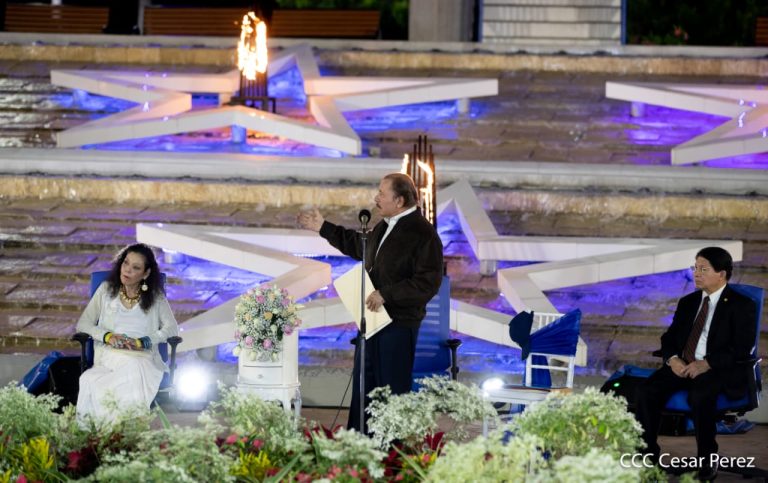20 de diciembre 2020

Children of Exile: The Births “Sowing Hope” in the Camp of Nicaraguan Farmers

PUBLICIDAD 1M
PUBLICIDAD 4D
PUBLICIDAD 5D
The bill prohibits candidates the regime considers “coup promoters” from running. “It’s a totalitarian measure,” opposition leaders say.

Gobierno publica legislación en La Gaceta
On Friday, December 18, Nicaraguan president Daniel Ortega sent a new “urgent” bill to the National Assembly. The bill is called “defense of the people’s right to independence, sovereignty and self-determination for peace”. From the outset, it prohibits the inscription of candidates that the regime considers “coup promoters”.
The law also prohibits anyone from running who applauds “international sanctions” imposed on Ortega’s family and government functionaries. The sanctions referred to were imposed by the US, Canada, and the EU for serious human rights violations.
Representatives of the political opposition called the law “totalitarian”, “repressive” and “illegal”. They assert it aims to “give the Sandinistas the power to decide who can and can’t participate” in the elections. General elections in Nicaragua are scheduled for November 2021.
The bill could be approved as early as Monday, December 21st. The vast majority of the deputies in the Assembly are from the Sandinista party and under party control.
The bill contains only two articles. The first establishes: “Nicaraguans who head or finance a coup d’etat; who alter the constitutional order; who foment or encourage terrorist acts… will not be able to opt for public positions.” The bill’s second article merely indicates the law’s publication and the dates it will remain in force.
Others disqualified from running include “those who incite foreign intervention” and “those who ask for military intervention”. Yet another grounds for disqualification is “organizing with financing from foreign powers, to execute terrorist and destabilizing actions that propose (…) economic, commercial, or financial blockades against the country.”
Tamara Davila of the National Blue and White Unity Political Council said the new proposal clearly reveals the regime’s intentions. These are to “de facto inhibit (…) any citizen who decides to compete in elections.”
Jose Pallais is a former National Assembly deputy and current member of the National Coalition. He sees Ortega’s bill as part of a “systematic fraud.” It establishes “conditions that forbid anyone from the opposition from participating” in the 2021 elections.
Pallais maintains that – if approved – the law grants the Sandinista party the power to “decide who can run and who can’t”.
Felix Maradiaga, also from the National Coalition, agrees. He views Ortega’s action as that of someone who is “desperate”. The law, he claims, empowers Ortega to use “any ruse to avoid his imminent defeat in an electoral contest”.
“It’s a lie that will lead to the disqualification of millions of people in Nicaragua. These citizens have requested in unison, and we’ll continue requesting, sanctions for those who have committed crimes against humanity,” said Maradiaga.
Ortega defended the proposal he sent to the National Assembly during the graduation ceremony of Police cadets. During his discourse on Friday, he accused the opposition of being “Nicaraguans in name only”.
Ortega described these dissenters as: “terrorists, criminals and sell-outs of their country, because they request more sanctions.” He failed to mention the reason said sanctions have been requested in the course of these last three years.
The sanctions currently include more than a dozen figures, many of them close functionaries of the regime and the party. Among those sanctioned is first lady and Vice President Rosario Murillo. All those sanctioned have been accused by the US and other governments of violating the rights of Nicaraguans.
“He who doesn’t defend Nicaragua; he who asks for sanctions against Nicaragua – doesn’t deserve to call themselves Nicaraguan. We can’t expel them, because they were born here. But automatically, in accordance with the Constitution and the laws, they’re losing their rights. They’ve already lost the right to opt for public office when the elections come to this country,” Ortega stated.
He added, a message to the opposition. “Don’t keep fighting over candidates to the presidency, because the laws won’t let you.”
Eliseo Nuñez, a political analyst affiliated with the Civic Alliance, spoke about the Ortega regime’s posture. He called it a clear demonstration of “their lack of will for any kind of electoral reform or freedom”.
Nuñez warned that, if the situation continues, “there’s no more hope” for future reforms or substantial changes to the electoral system. There’s no hope the regime will move towards free, fair, and transparent elections, as requested by the Organization of American States’ General Assembly.
Nuñez declared: “It’s unacceptable that Ortega could choose his own opponents. Nor is it acceptable to continue playing this game.” Nuñez also warned that this new proposal confirms the regime’s intentions not to negotiate. “They’re betting on non-peaceful solutions” to the socio-political crisis that began in April 2018, he believes.
Jose Pallais noted that it’s still possible to “dismantle the fraudulent design Ortega has organized”. He noted, though, that the decision to “desist from” participating in the elections “should remain under ongoing evaluation.” It shouldn’t be decided “until this scheme that Ortega has set up becomes completely impossible to dismantle.”
Archivado como:
PUBLICIDAD 3M
PUBLICIDAD 3D